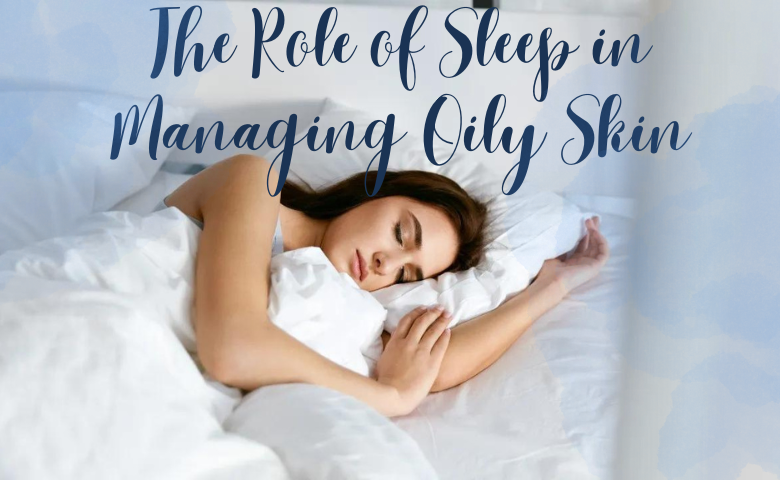
Table of Contents
How Sleep Contributes to the Management of Oily Skin?
“Oily skin” is the condition that is marked by the overproduction of the serum, which—as a result of its increased secretion—causes the skin to become shiny and often causes breakouts. One aspect of the external environment that is often neglected has to do with sleep, whereas skincare products that are needed in order to control the production of oil that causes oily skin are crucial. Although many of us understand that sleep is essential for general wellbeing, the precise function that it plays in controlling the state of the skin that is oily is unclear. This article aims at establishing whether the role of sleep in managing oily skin appears healthier when one has adequate rest.
A Complex Relationship Between Sleep and Skin Health
Many skin issues are self-healing during a person’s sleeping hours. Another chemical is secreted during our night’s sleep, known as growth hormone, which contributes to collagen synthesis and repairing of injured tissues. Skin’s collagen is said to determine both the skin’s elasticity and water content. The body produces all natural growth hormones when you sleep and these are responsible for the regeneration of skin. People’s hormones, in particular, also depend on sleep to a great extent.
Stress leads to secretion of the stress hormone, cortisol; this in turn causes secretion of sebum. It also means that skin does not produce excess oil when we are able to get more quality sleep as our cortisol levels are thereby brought down.
The Science behind Sleep Managing Oily Skin
Hence, it also explains that while lack of sleep can lead to increased cortisol levels, this is a very bad thing for any person who already had issues with oily skin. The relationship between attaining a proper sleep and having oily skin is not a simple one. As you sleep, your skin barrier function is also replenished by sleep to assist with issues with dryness or issues with abnormal oil production as an adaptive mechanism. When the skin is dry it may secrete more oils in an attempt to enhance its moisture and protect it from remaining damage. Another way with which we can help fortify skin’s oil-water balance would be to ensure we get adequate amounts of sleep and take adequate water intake.
Furthermore, stress from the lack of sleep that a person has can contribute to his/her skin, damaging tissues in the body and thus, cause problems such as inflammation and breakouts that people with oily skin complain about most often. The body is more equipped to protect itself from germs and other factors that can aggravate the skin when one has enough sleep in their body.
Sleep and Oily Skin: a cycle that surely can be dangerous
To recognise that there is usually a circular causality between sleep and the production of sebum, one must first acknowledge their existence as intertwined. Lack of sleep makes the skin produce even more oil that results in more breakouts and irritated skin. On the other hand, having greasy skin conditions may result in feelings of discomfort or perhaps shyness which may interfere with the normal sleeping pattern. In order to eradicate this kind of a cycle, stress placed on healthy sleeping habits, as well as the healthy skin care regimen is crucial.
Tips for Better Sleep and Skin
Take into consideration the following recommendations in order to make the most of the benefits that sleep offers for reducing Oily Skin:
Establish a Sleep Routine: Your body can entrain when you go to bed and get up at the same time every day, as well as change its internal clock.
Establish a Calm Bedtime Schedule: This is because when getting to the bed there are several ways that have positive effects on the body, for instance one can take a bath or read a book before going to bed to send the body a signal that it is the time to sleep.
Optimize the sleeping environment that you are accustomed to: Unfortunately, dozing off to the sound of soft music or the feeling of cool breeze is not possible in the real world and therefore, if you want the best weather for sleeping, this should be done in a room that is as dark as possible, noiseless and comfortably cold.
Use the Right Pillowcase: For the skin to be protected from any form of discomfort that may arise from rubbing against the pillowcase choose a silk or satin pillowcase.
Proper Skincare: As for best skincare routine, you should always remember to clean your face gently in the evening in order to wash away sebum and dirt. However, you should wear strong cleansers because these have the possibility to strips off the skin layer of the natural skin oils.
Manage Stress: Eliminate the amount of stress that is present by participating in activities such as Yoga or meditation. This will assist you in regulating your tension levels, to reduce overstress. This will be of benefit not only to your sleeping patterns but also to the condition of your skin.
These suggestions and awareness about how sleep affects the health condition and the control of oily skin types will help you to stay healthy. Cleansing your face every morning, toning, moisturizing and weather permitting using sunscreen during the day as well as going to bed at a set time and waking up at a set time will bore great results on your skin.
Here you can read about Essential Do’s and Don’ts for Managing Oily Skin
In conclusion
As for the relationship between sleep and oily skin, there cannot be any doubt. Incorporating enough sleep in peoples’ lives will greatly help them enhance the quality of their skin. Should the body be supplied with the correct dose of sleep, the epidermis of the body is made stronger, the body’s self- healing mechanisms boosted and the hormones balanced. It is also important to know the role that sleep contributes to the healing of oily skin if the person wants to have healthy skin. This is so because despite the fact that skincare products are still a necessity. Culturing good sleeping habits and the avoidance of any conditions that are likely to interfere with this natural body function gives sleep the potential of enhancing the skin’s natural glow. Do not forget that beautiful and healthy skin and sleek, rich and healthy looking hair is the reflection of a muscular and well rested organism.
Surprisingly, it is quite typical that people do not pay much attention to the role that sleepiness plays as part of an oily skin treatment. While focusing on sleep, skin becomes less red or pink and fewer puffy as well as the skin bacteria is regulated.
